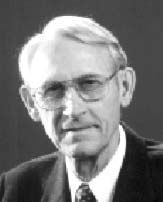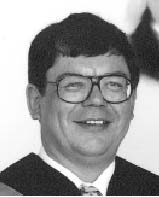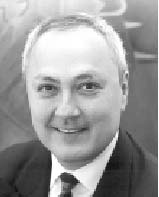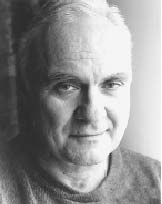
June 18, 1999
The University of Alberta's 1999 spring honorary degree recipients

Gerald Maier |
Vice-chair of Nova Corporation, Calgary's Gerald Maier is a leader and respected voice within Canada's energy industry. In 1992, while chair and CEO of TransCanada PipeLines, Maier helped orchestrate one of the largest mergers in Canadian history-TransCanada Pipelines and Nova Corporation-to create the fourth largest energy-services company in North America.
My first piece of advice is this: although you are graduating, do not consider this milestone a signal that you can now stop studying and learning. You should never stop seeking knowledge. You can, of course, learn and acquire that knowledge without a textbook, a lab, or a classroom, but you have to work at it continuously. Failure to do so triggers regression.
My second piece of advice is don't fear change. You may be apprehensive about it, and you should respect it, but don't fear it. Most often, change ends up being beneficial even though it can be a little painful at the time. Look at change as more of a transition. After all, you have already gone through many transitions! It was a big transition for you when you started school in Grade One. Graduating from high school and entering university was a major transition.
Advice number three: choose a career that excites you, one that you believe will stimulate and challenge you for many years, if not for life, and one that will give you the freedom, flexibility and work environment that you believe is essential for you and your family. As university graduates, you might be thinking that this advice is coming a little late because you have already chosen your profession. Let me assure you it isn't too late. Within each of your chosen professions there is great flexibility as to what you do, how you do it and where you do it.You've learned to analyze, to rationalize, to conceptualize. You've learned how to transform information into knowledge.
Four: When you first start employment in an enterprise, don't be overly concerned with either your title or the compensation. If the job is right for you, and you like it, you will do well. And, if you do well, the promotions and the compensation will follow.Be prepared to walk the extra mile and don't shrink back from taking on the toughest task. Yes, often that can be a burden, but in the long run you'll learn a lot, you'll gain a sense of accomplishment, your confidence level will increase, and you'll be noticed by your leaders as a leader. Ultimately you will be rewarded manyfold for giving that "extra" of yourself.
My last piece of advice, number five, is one that you can tuck away in your memory bank for a while. It may never be applicable to you, but in any event it is unlikely to be needed until a year or more after graduation. I am putting it forward today only because I see too many people, and some very intelligent people, going through life unhappy with what they are doing.If you find your job isn't what you thought it would be, or if you simply don't like what you are doing and can't foresee the situation improving, then quit! Stop! I can't think of anything worse than getting up every morning to go to a job that you hate. The only person who should do that is an executioner.

Millard Dean Fuller |
There came a time in my life when I questioned deeply what I was doing. I decided that there was more to life than money and position. As a result, for the past 30 years I have been pursuing other goals.
How will you use your God-given talents in the years ahead? How will you apply your knowledge in service to your community, nation and world?
Imagine you are my age and a movie has been made of your life. Take a second, and look back over the great "scenes" of your life. Is the story about the people you inspired to be more and to do more? Is it about the weekends you spent helping children learn to read? Is it about persuading your company to give some of its resources to a worthy cause? Is it about being part of a loving family? Is it the encouraging word or pat on the shoulder you offered a troubled friend?
Or.Does the movie resemble the story line of my early years - featuring a scramble to get to the top? The expensive car sitting in the driveway? My family that felt abandoned and emotionally neglected?
Is this a movie that you would want to rent or show your kids or your parents? Could you even stand to watch it alone?
Will your life be largely defined by material possessions? Building a big bank account? .or will it be a healthy balance which includes helping yourself to be a "whole" person as you are helping others with their needs?
While the TV news people claim that your generation is the X or the Y or maybe the Y2K generation, a generation that is remarkable only for your commitment to money and power and the World Wide Web, I have seen a different type of young man and woman.
What I see are thousands and hundreds of thousands of young adults involved in Habitat for Humanity and other neighbor-helping-neighbor organizations .a segment of society that is public-spirited, idealistic, searching for distinct ways to connect to people and the concerns of those surrounding them. You are world helpers in every sense of the word-embracing those in need, giving your time and talents and caring for the world around you.a world that so desperately needs individuals like you.

Dr. James MacGregor |
One of the great challenges will be the need to keep current in your field. In your education to date, you have learned the fundamentals and have mastered the current state-of-the-art in your field of knowledge. More importantly, you have learned how to learn. The disciplines represented here today are changing at the speed of light. The half-life of the knowledge you have learned is probably less than 10 years. As a result, half of what you have just learned will be outdated in 10 years or less. To keep up with future changes you will need to continuously upgrade your knowledge. The learning skills you have developed at university and your grounding in the fundamentals of your fields of endeavor will allow you to do so. In this computer-assisted age, you cannot depend on black box computer programs, you must know the principles of your field. You will learn a great deal through your work and your involvement in technical societies.
Jobs are available in Alberta for well-educated young people and I hope that the majority of you have found challenging employment in your field. The days of one position for life are gone for many of you. Today's graduates may have five or six careers before they reach retirement age. This may mean relocating several times during your working life. Accept your university education as preparation for this. Build your future on your ability to learn and your ability to apply what you learn.
We live in a global community. We no longer can avoid or ignore what happens in Europe, the Middle East, Asia and other parts of the world. The past 40 to 50 years have seen immense technical advancement, greater than ever seen in history.Society has lagged way behind in tolerance and moral respect for others. I cite the troubles in Ireland, the current situations in Yugoslavia, Africa and East Timor. Within Canada we are faced with aboriginal land claims and treaties. We must deal with the integration of new immigrants and refugees into our society, and we must understand Quebec's aspiration and threats to secede. In the latter area I look to the graduates from Faculté Saint-Jean to bridge the difference and provide greater understanding of our two cultures... '
In this new world, success will come from tolerance of others' points of view, and from working to your potential. The greatest task for you, the next generation, is to find solutions, no matter how small, to our mistrust and intolerance.

Harold Cardinal |
Cardinal did not speak from a written text; the following is a near-verbatim excerpt of his address.
I used to be somewhat bewildered when I began my training in the traditional ways of our people to hear an 80- or 90-year-old man or woman say to us, "But you are a mere child." My knowledge is only that of a child.
And I used to find it difficult to understand what was meant by the elders when they said that. But what they were describing for us is that the pursuit of knowledge is something that requires a lifetime commitment. And so immense is the field of knowledge that our Creator placed for us that even within our lifetimes, we will never have enough time to begin uncovering the full immensity, the full glory of that knowledge. And so it is that our way of life was built by our traditions, by our people, to encourage the pursuit and the study of knowledge.
And much like you have been involved as graduands in pursuing your particular fields of knowledge, it has required commitment. It has been at times a very lonely, heavy endeavor. For the pursuit of knowledge is something that rests in the individual.
It is at the same time our communities, our families, that help us to transmit the knowledge. We require the support, the network of our families, our communities, our people in the ways of life that we have. And it is the traditions and the values inherent within those traditions that we need to examine so that all of us who are inheritors of one of the most blessed places on earth, that we can pass on the same kind of legacy, the same kind of blessing to generations yet unborn. And for that, we have to discover within ourselves and within each other those values that we need to build a generous, a sharing, a caring community for all of us who have the privilege of walking on this land that we call Canada. That is the challenge and the opportunity that we have.
And much like those of our people who pursued knowledge, once knowledge was acquired, it was then up to them to decide how big a heart they had, how much of that knowledge, how much of those skills that they learned, they would share with their community, with their people.
That is the challenge, the opportunity that you now have as graduands. And I wanted to offer my heartfelt congratulations to all of you, to offer my deep and sincere gratitude to the University of Alberta for the honor which has been accorded to me, and to encourage all of you like the president.
Enjoy, savor, acknowledge, and celebrate your achievements.

John Kim Bell |
When I started the national aboriginal achievement foundation those many years ago, there was not one person that actually believed I would be successful. Not even the members of my family.
What I proposed to do was to create a national effort that would incorporate the whole of Canada, not just aboriginal people in our advancement. But not one person believed it was possible. I also had my doubts. I recognized that if I were to pursue this line, I would have to dedicate myself to it. It wasn't easy.
From my own people I was rejected. As a symphonic conductor, I was very much assimilated and not really perceived as being aboriginal. To the government I was really not that well known. I didn't really have a lot of clout going in to see the government; I didn't represent any particular segment of the aboriginal populace in their eyes, and so I was rejected by government and went to corporate Canada.
I was a friend of corporate Canada as a conductor of the Toronto Symphony, but later after my appointment ceased, I was no longer the same friend that I had been when I pursued the advancement of aboriginal people...I decided not to give up. For when I started, I realized I would have to dedicate myself to this purpose. And that is what I did.
If there is a lesson to be learned in all of this, it's this: you can do anything with perseverance and attitude...
When I started, there were many aboriginal organizations, and there still are many aboriginal organizations today. I started with bank loans, producing concerts that were highly risky and totally improbable. Today the national aboriginal achievement foundation leads the aboriginal community in raising corporate support. We provided last year $1.7 million in scholarships to aboriginal people across this country in just about every university that exists, in all areas, from business, sciences, medicine and health care, social services, education, and yes, the arts. We are the largest supporters of the advancement of aboriginal people through education outside of the federal government. And I believe as the future unfolds, we, through the effort of self-determination, will have to enhance this effort.
To you graduates: You can accomplish anything you want. You have the power to change anything. Maybe one of you will discover the cure for cancer. Maybe one of you will become a great composer and be remembered for hundreds of years. The choice is yours.

Kenneth Welsh |
Welsh did not speak from a written text; the following is a near-verbatim excerpt of his address.
It seems that I have always had an impulse to step out on a stage and make a fool of myself. An impulse which has not left me and which to this day brings me the same joy as it did when I first stumbled into it 40 years ago. My heart was once and forever broken by the intuition that the dream which had suddenly overtaken my entire being could somehow be fulfilled.
But it would never have happened but for another sort of heartbreak. The fact that I'd been jilted by my first girlfriend who, in order to appease her guilt, I believe, told me that the drama course was easy credits. And she even offered the text book as an added incentive. She was wrong about the easy credits.
Thus it was that, led by the hand of a mysterious muse, whom I believed to be guiding my destiny and I still do, I was led onto the stage at Strathcona Composite.
I think that perhaps Mr. Shakespeare has been my constant muse. Once, many years ago, I was cast in the role of Edgar in King Lear. Now, this young man is forced to throw away his identity and become nothing in order to find himself in a much deeper way. It happened that at the same time I was visited by an uninvited emotional collapse. It was through the parallel journey with Edgar that I began to see the world in real colors again and I learned a great lesson from something he says to his father: "Men must endure their going hence, even as they're coming hither. Rightness is all. There is birth; there is death, and there is that one moment when the fruit of the tree achieves its richest complexion."
I feel this to be the moment of my ripeness and I am deeply moved by the gift that has been given to me today. And so, what can I say to you as you embark on your role toward ripeness: that you must intuit your destiny, look for your muse to come in the dark and tell you that it is okay to follow your dream, that there will be many sorrows to be healed but that is what will make you whole, that your hearts too must be broken with the revelation that the universe is composed of compassion and that that truth is magnificent and inescapable..
I invite all of you to live in the mystery and embrace the joy in all things. May your sacred dreams of who you wish to be become who you are. And may the muse be with you. I offer the final eloquence to Hamlet: "The rest is silence."


